My Memoir by Stephani Heirshberg
Medical Mission 2009
Thirty-three hearts, sixty-six helping hands, hundreds of sick patients, five days, one cause and half of a hospital. As I sit here today at the park with my six-year-old son, Dakota, and Maggie, my Siberian husky, I reflect back on the week which changed the way I will view life forever.
I look around at all of the kids playing on the playground, all caught up in their everyday lives. I look to the left of me and there are three boys swinging on the paint-chipped monkey bars; to the right is the squeaky swing set where two moms complain to each other about their day as they push their grinning children higher, paying little attention to them. Behind me is a little girl in a pink dress, tears running down her cheeks while she cries at the sight of her slightly bloody knee she scraped when she fell on the sidewalk while playing tag. Her playmate is a frumpy, slightly overweight red-headed boy. Looking around it becomes so clear, living in America, that we have no idea what we take for granted every day; the simple things such as the meals we eat, the conversations we have, the parks and playgrounds we take our children and pets to, the clothes we choose to wear to express ourselves, electricity, running water or a healthy environment to raise our families.
Just shy of two months ago, I packed my bags for my first trip out of the country to volunteer on a medical mission I was invited be a part of with Dr. Santiago Calderon and Dr. Pablo Perez, in a small province called, Santiago de Chuco. Santiago de Chuco has a population of around ten-thousand people with most of them being of Incan descent. This province remains very poor and has seen little to no social, economic or educational advancement since discovered about 500 years ago. Their living conditions are less than desirable with paper-thin walls and more often than not, incomplete or collapsed roofs, which lay loosely on buildings constructed by hand out of mud bricks held together by strands of hay. Running water is scarce and warm water is nonexistent. Clothes are washed by hand, if at all, and then hung outside to dry. Vacuums and mops have never been heard of. It hardly rains so the streets are filled with dirt and the walls hold so much dust you can see layers of fingerprints from people who have touched them over time.
Fifty-one weeks out the year folks from all over Peru work hard for the opportunity to travel to Santiago de Chuco for one week of day and night festivities to celebrate the discovery of the town and freedom from the Spaniards. The typically quiet streets become lively and restless; the people dance, make homemade firework stands, and drink Trujillo water “beer” all day long in the streets. Being descendants of Socrates Perez of Santiago, Dr. Calderon and Dr. Perez have attended these celebrations annually and gained awareness of what the town was in need of: medical help. After their last trip, they made the idea of helping a reality. With the aid of an associate of Dr. Perez, they spent the next year planning and coordinating the first annual medical mission to Santiago de Chuco. They stuffed suitcases with medicines and gathered medical supplies in preparation for the trip.
What I imagine could only be an endless amount of work needing to be done to make sure that this mission was seamless, paid off the moment the bus arrived to the top of the hill. As we turned the last corner a mile from the town, we were greeted by the locals holding signs that read “welcome” and “thank you”. Bands played joyous music on the trombones, trumpets, drums and tubas, and every single person wore a giant smile and eyes filled with tears of happiness. We danced the local dance, Hauyno, hand-in-hand all the way down the hill to El Market, where we were introduced to the Doctors of Santiago before heading to bed. In the morning as we walked to the hospital little expectation had been set, so it was a great surprise as we saw hundreds of patients lined up waiting for us in 30-degree weather just for a chance to be examined and a hope to be healed. People of all ages stood in line patiently and cheered as they saw our group arrive, a group consisting of Doctors of Internal Medicine, Infectious Diseases, a Surgeon, Gynecologist, Pediatrics Specialist, nurses, medical students, a Pharmacist, and other non-medical help. Hour-by-hour we examined patients, wrote prescriptions, and sent them on their way to what we could only hope for, a better quality of life. Despite the living conditions these people were used to, every man, woman, and child who came in the non-sterile exam rooms were humble and in good spirits. Each day the lines grew longer and we saw more people than the day before, and each day we made an impact on more lives, regardless of the amount of bugs and dirt piled into the corners of the hospital. We gave them hope, health, and hugs that will add value to each of their lives.
On the last day in Santiago as we were eating our last meal, four beautiful little girls that I had met the first day we arrived at the hospital ran into the restaurant (if that is what you call it) looking for me, hoping they could see me once more before I left. Their soft little hands filled with flowers they picked and arms filled with hugs. They clutched my waist and held on tight. Their aunt and mom came over and extended their arms to me, as well. While we took pictures and shared smiles and hugs, they never let go of me. It was at that moment it became obvious I made a difference to those little girls and to many others I am sure.
We left that afternoon and made our way to hike one of the Seven Wonders of the World, Machu Picchu. As I sat on a giant rock at the peak of the mountain, I realized it did not take parks and monkey bars, nice clothes or fancy cars to live a quality life. It takes health, hope, love and open hearts. It definitely was nice to get off the plane and come home to hot showers and American food, but I will forever be grateful that I was given the opportunity to live a much richer life by seeing the world through the eyes of those less fortunate. I will always know that with the aid of thirty-three hearts, sixty-six hands, one cause, working for five days, helping hundreds of patients, we made their hospital whole.
Subscribe to:
Post Comments (Atom)

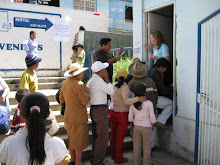
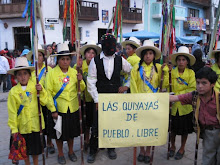
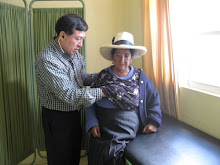
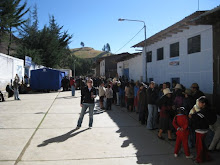
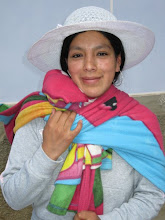
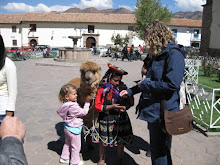
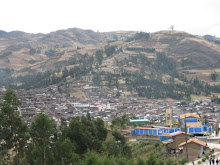
No comments:
Post a Comment